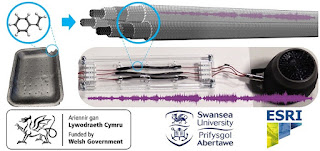Researchers at Swansea University are working on a project that changes waste plastics into highly valuable compounds for the energy industries. Scientists are extracting carbon atoms found in waste plastics and turning them into a nanotube format that can be used for the transmission of electricity. They are producing plastic electric cables without the copper wire inside them, which can be used in residential and industrial construction.
The vision is to advance global energy sustainability by producing long range electricity
Dr Orbaek White said, “Converting plastics into useful materials such as carbon nanotubes can be done
Plastics are a resource of carbon and hydrogen, so the key step is in developing methods of chemistry
Testing Range of Plastics for High-quality Materials
Scientists will test a large range of plastics that are problematic for traditional recycling technologies.
The capital grant will be used to test the electrical and physical properties of the carbon nanotube
Transition Towards Efficient Energy Sources
The research tackles two important problems facing the environment: A transition to more efficient,
Major Challenges for the Researchers
A major challenge facing recovery of plastics is that they often must be downcycled; this new work promising
Carbon based nano materials are used in a variety of applications across the globe, but they are often
TrimTabs, a Swansea engineering firm creating technology solutions for positive global impact, is collaborating
Source: Swansea University
Receive weekly digests on hot topics
Online Course Recently Added

Get updated on latest high heat plastics developments and explore new ideas to address the growing demand of higher continuous & peak temperatures, better chemical resistance, dimensional...








No comments:
Post a Comment